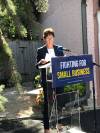Education a political priority
Advertisement
Read this article for free:
or
Already have an account? Log in here »
To continue reading, please subscribe:
Monthly Digital Subscription
$1 per week for 24 weeks*
- Enjoy unlimited reading on winnipegfreepress.com
- Read the E-Edition, our digital replica newspaper
- Access News Break, our award-winning app
- Play interactive puzzles
*Billed as $4.00 plus GST every four weeks. After 24 weeks, price increases to the regular rate of $19.95 plus GST every four weeks. Offer available to new and qualified returning subscribers only. Cancel any time.
Monthly Digital Subscription
$4.99/week*
- Enjoy unlimited reading on winnipegfreepress.com
- Read the E-Edition, our digital replica newspaper
- Access News Break, our award-winning app
- Play interactive puzzles
*Billed as $19.95 plus GST every four weeks. Cancel any time.
To continue reading, please subscribe:
Add Free Press access to your Brandon Sun subscription for only an additional
$1 for the first 4 weeks*
*Your next subscription payment will increase by $1.00 and you will be charged $16.99 plus GST for four weeks. After four weeks, your payment will increase to $23.99 plus GST every four weeks.
Read unlimited articles for free today:
or
Already have an account? Log in here »
Hey there, time traveller!
This article was published 13/09/2023 (861 days ago), so information in it may no longer be current.
As our Indigenous friends and neighbours remind us that Every Child Matters, our children and grandchildren are off to another year in school amid concerns for their post-COVID academic losses, their mental states, increased substance abuse, the rights of parents and teacher shortages.
We are in an election campaign where the only mentions of education so far has been the property tax rebates and legislating parental rights. Maybe it’s time we and our politicians become more thoughtful about our attitudes toward our children, our obligations to their schooling, their protection and well-being, and the world in which we are educating them.
Renowned political philosopher, Hannah Arendt, in a 1961 essay called The Crisis in Education, clearly puts these responsibilities in the corner of all adults, “Anyone who refuses to assume joint responsibility for the world should not have children and must not be allowed to take part in educating them.” We can presume that she saw the education of children by the public as a safeguard against repeating the Holocaust. I think we can also safely presume that she would have been alarmed, even terrified, by our latest educational and political developments.
In the same essay she emphasized the potential that exists in every individual to contribute, as an adult, to making the world a safer, kinder, and more inclusive space and place, but only if they have a rich educational experience. She saw education’s responsibility as preparation for a better democratic future, one that was created by today’s youth building on the knowledge and experiences of the past. These are important reminders that individuality matters, and that education has among its purposes: helping people become good people, and preparing them to make the world a better place.
To date, and in this election campaign, these purposes fundamental to the sustaining of a democracy remain silent or couched in other terms.
Some defer, like Bill 64, to schooling as a narrow band of educational achievement. While academic achievement is admirable, it is no substitute for a sense of belonging and worth and hardly sufficient to justify the overwhelming anxiety about personal merit experienced by so many of our children. An academic curriculum is not enough, nor is just fitting in to some political or economic scheme.
For example, we do not teach the sciences to turn everybody into scientists, but we do teach it for all children to achieve a regard for scientific reason, and some do go on to become major contributors to our scientific knowledge and application. We teach mathematics, the social sciences, the humanities, and the arts for the same reasons — some common understanding for together making sense of the world we live in.
Particularly concerning are two alarming trends. Firstly, that we can somehow put off things that need immediate attention, thus leaving them for our children to deal with. Environmental degradation, global warming and world hunger come to mind.
Second, that we can hive ourselves and our children off from the rest of the world, shielding them from the world’s realities and denying them the opportunity to learn how to live with diverse others and differing ideas. Indigenous reconciliation, racism and gender issues are examples. Our politicians’ campaigns neglect, or misrepresentation, of the educational imperative to educate our children jeopardize the world that Arendt imagined, perhaps realizing her greatest fears.
To know the history, and the consequences, of this political path we need look no further than to our southern neighbours whose Grand Old Party is leaning toward the classic definitions of fascism — a mass movement (MAGA) of misinformation and extreme populist nationalism promising restoration; a leader (Trump), who places himself above the law and brooks no disagreement from anyone, and continuous threats of violence — and its spilling over into schooling.
At its worst, the curriculum is becoming doctrinaire, revisionist and racist. Teachers are being threatened. Local authorities who resist are sanctioned. The most vulnerable in the system are publicly excluded. Impoverished schools cannot fulfil their mandates but are accused of failure. Basically, the protections and safeguards built into public education to ensure children can become self-governing, self-regulating individuals with a public conscience are nullified.
Let’s tell our politicians not to sacrifice our children’s education and democracy on the altars of money and political ambition!
John R. Wiens is dean emeritus at the faculty of education, University of Manitoba.












